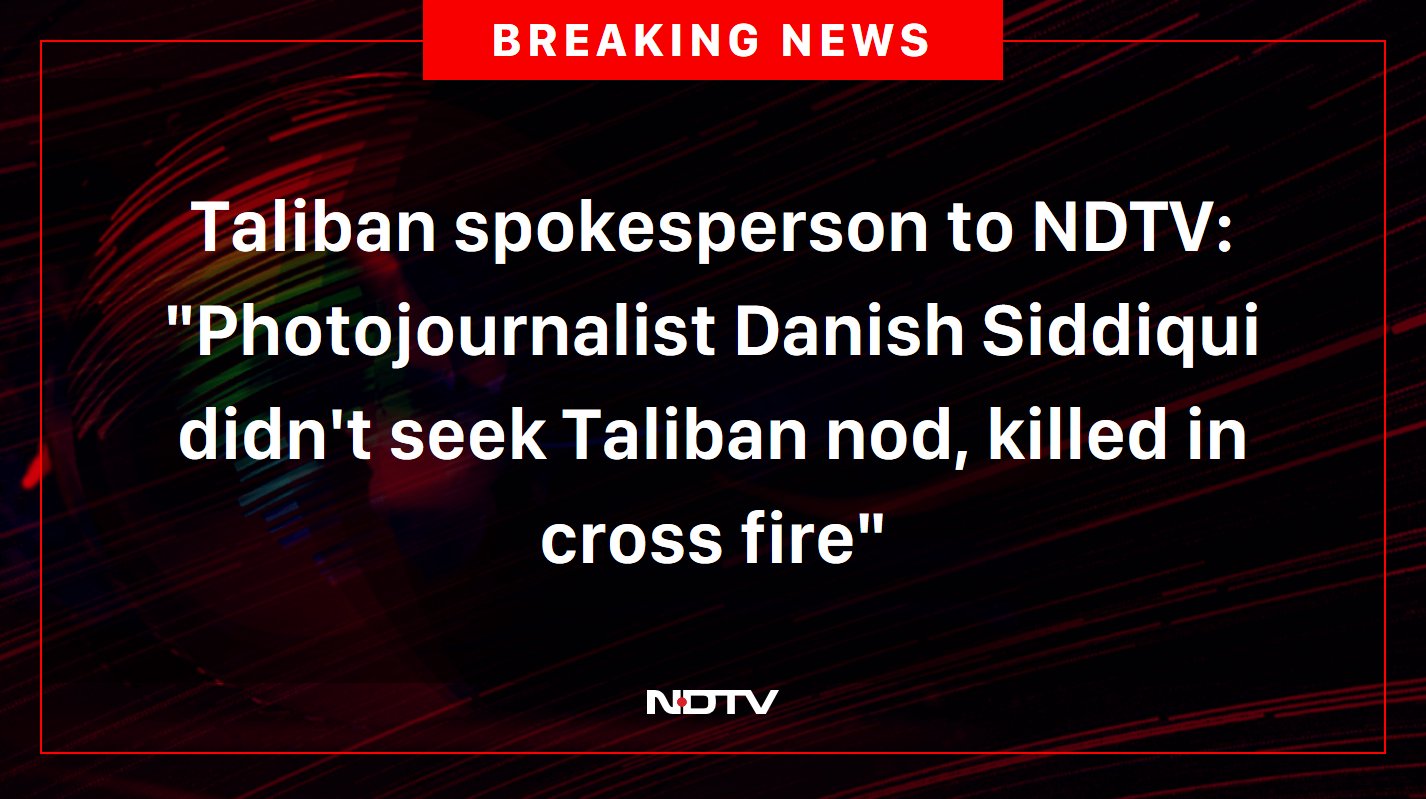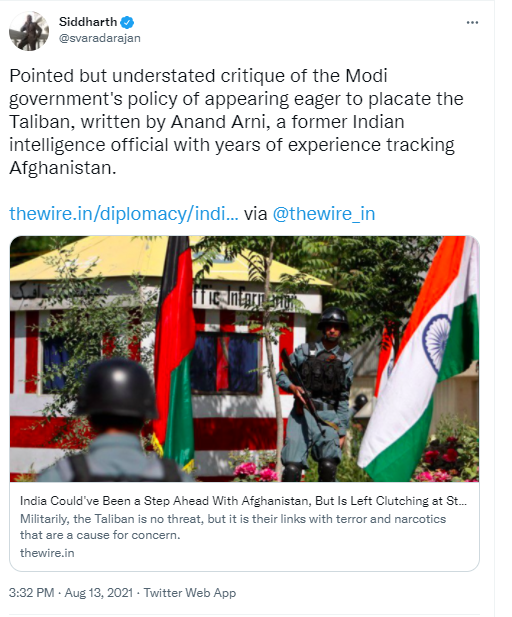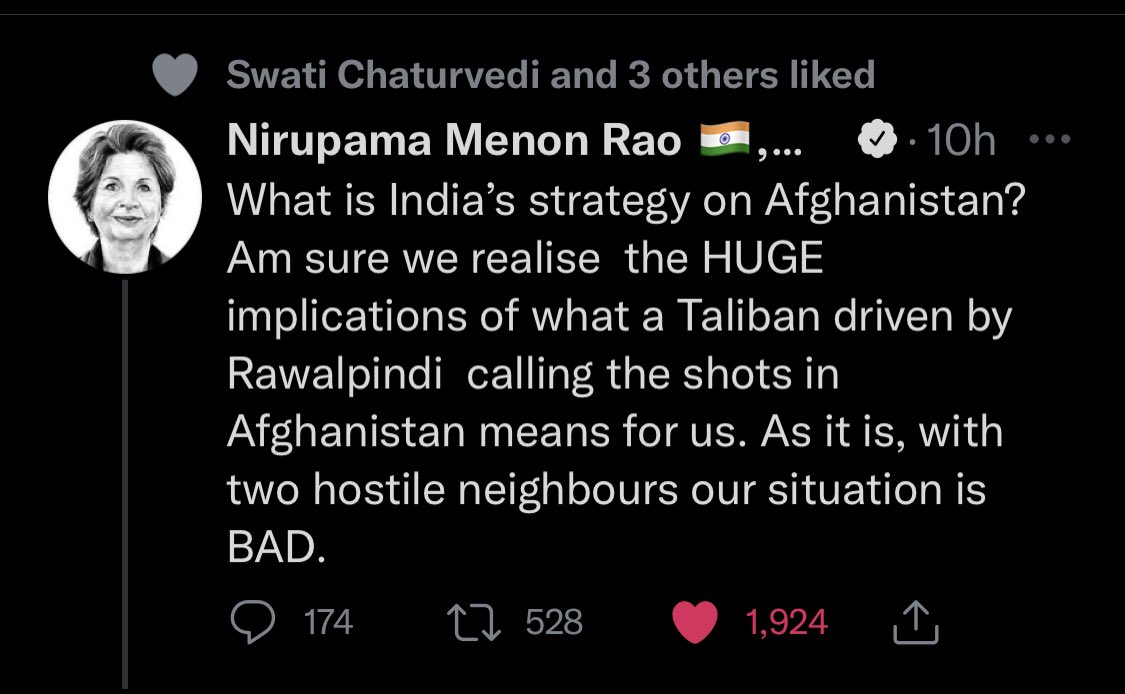A historical analysis of the Afghan state's role in the Indian sub-continent and its extrapolation to potential geo-pol implications
Afghanistan and the subcontinent: an inseparable history of conflict
The region and peoples that live in the current state of Afghanistan have been playing a very unique role in the Indian subcontinent for almost 1000 years.
Afghans live in a unique country. Its climate is extremely inhospitable with majority of the land experiencing either hot or cold desert conditions. Agriculture and industry has therefore been very hard to pursue given these conditions. However sitting at the "center of Asia" - and tempered by the harsh conditions, the warlike people of the country have often "struck out" throughout their history and have taken up a predatory role - bandits looting caravans, tribes breaking out of their desolate mountains to raid cities and in fact, for long tracts of their history - conquerors and rulers of surrounding lands. If I was to use an analogy, the wolf comes to mind.
A good source to get a bird's eye view of their domination as conquerors can be had by eyeballing this page -
https://en.wikipedia.org/wiki/List_of_w ... fghanistan
If I were to chronologically look at tracts of Afghan history of the past 1000 years, I see it as -
1000-1215 AD: Ghurids. Orignally Buddhists, post conversion to Islam and consolidating the Afghans they ruled over a massive kingdom covering modern day Pakistan and most of North and Eastern India.
1290-1325 AD: Khalji. Post a period of decline and confusion post Ghurids and domination by Iranian Khwarezmids, Afghan Khaljis came into thier own and ruled over modern day Pakistan and large tracts of North, West and Southern India.
1325-1525 AD: this was a period where Afghanistan was chewed up a lot by the Mongols and mostly kept within hemmed within the Timurid empire.
1525-1738: Mughals. Afghanistan was splintered into 3 parts the western part being ruled by Iranian Safavids (abutting the current Hazara provinces), Northern by the Mongol Buryat Khanates and Eastern by the Mughals. Afghans did very well under the Mughals - Babur more or less considered Kabul as his home and this sentiment remained for all following emperors. Afghan soldiers and administrators were key in ruling the subcontinent for the entirety of the rule and Kabul served as the royal mint and armory. Even Afghan adventurers such as Dost Mohammed, came down and formed kingdoms like Bhopal. Bengal Afghans, Rohillas - all shapes and sizes of Afghans had a great time.
1747-1823: Durranis. Post a hiatus caused by Iranian Nader Shah, Afghans consolidated and unified under Ahmed Shah Abdali and established rule over modern day Pakistan and parts of North India. Durrani rule was peak of predation over Punjab and also its raids deeper into norther India including the one where the reduced the Maratha army at Panipat.
1830-1947: Emirate of Afghanistan. With the coming in of the British rule in India, the Afghan direct rule abated but it was marked by three Anglo-Afghan wars - all wars where the first bullet was fired by the Afghans - and countless skirmishes where Afghanistan repeatedly disrupted territory in modern day Pakistan. Constant skirmishes and raids made the frontier known as a wild, restive region.
1947-73: Kingdom of Afghanistan. The Durand line caused several skirmishes with Pakistan including serious ones in '49, '55 and '60. The relations could be described as quite bad.
1973-96: Republic of Afghanistan. The soviet satellite which was devastated by the Afghan war saw conflict often spill to Pakistan, thousands of Pakistanis directly died fighting in the war. Had the republic survived they would have tried to dismember Pak.
1996-2001: Islamic Emirate of Afghanistan. Taliban ruled over the part of Afghanistan excluding controlled by Northern Alliance for all of five years. However in this period, Taliban either directly exported or gave refuge to mujahedin mercenaries who went on to fight in far flung areas from Chechnya, North Africa, South East Asia, Kashmir, Xinjiang and ultimately the conspiracy which hit New York. Meanwhile they caused major problems to India with militancy in Kashmir reaching historic highs. And while Pak was not attacked, large part of Pak were "Talibanized" with Taliban freely imposing their cultural will and power over Waziristan and FATA. PAk kept quiet and took it in the ar$e like the r@mdi it is.
2001-present: Transition government. Involved in numerous skirmishes with Pakistan. However the real challenge came via Tehreek e Taliban Pakistan (seeds of which had been sown in the region during the Emirate period itself), which ran an insurgency which resulted in the deaths of thousands of Pakistani soldiers and tens of thousands of civilians.
Insight: We therefore have the history lesson of a thousand years to conclude that
Afghans, inevitably prey on other nations - this trend is only reinforced when Afghans are consolidated and united under a single authority - as seems to be happening right now. At the very least,
Punjab and Sindh have practically been Afghan tributaries for 1000 years. That is simply how Afghanistan and its people survive, else they tear themselves apart.
With this insight here is my attempt at reading geo-pol tea leaves in the near to medium term ('21-'26),
US, EU: Tactically the retreat is a big win as the coalition rids itself from the world's first trillion dollar war which was needlessly propping up a thoroughly incompetent and corrupt Afghan plant regime. The biggest beneficiaries of the massive Allied effort clobbered into place by Bush's hectoring, ironically, were countries who were fence sitters: India which saw Kashmir insurgency ebb, Uighurs in China, Chechens in Russia, assorted militant groups in the Middle East, East and West Africa - all saw their "safe space" being taken away giving the respective nations a chance at respite and shoring defenses. Yes, there were the ISILs of the worldbut with an Afghanistan under Taliban, the situation would only have been much worse. The sheriff of the world can therefore hang his boots and take some well deserved rest. However, fully expect AQ and other old ghosts of the past to re-emerge within the next couple of years causing violent terror attacks on the west to surge. Politically this may strengthen right-wing parties.
China: A major stink bomb just went off in China's backyard. I fully expect most BRI projects to stall and die out as the region is engulfed in a massive spiral of violence. While I do think any potential Uighur upsurge will be crushed down with a mailed fist, it will still cause China problems on its Eastern front where it wants to otherwise single mindedly focus on India. There already are reports of Uyghurs making up a few thousands in number of the Taliban. Overall the stakes in South China Sea and the Malacca straits as the only reliable trade route will increase and China's efforts to militarily secure this route will also build pressure on ASEAN, Taiwan and Japan - increasing instability and likelihood of war.
Russia and the Stans: A Taliban victory is terrible news for Putin and other assorted dictators who rule the Stans. I fully expect separatist movements from Tatarstan to Chechnya to reignite. Ditto for Stans as Uzbeks, Tajiks etc now make up 40% of the Taliban and they will be more than eager to spread their banner over the countries of their ethnicity. Realpolitik from the West will only encourage these efforts to shake up Putin's throne.
India: Like the ANA, India was also afforded 20 years to prep up its defenses. While one has clearly failed, it is to be seen how well India is able to deal with the surely coming upsurge in militancy. I fully expect a massive spike in fighter numbers, weapons and tech in the Kashmir insurgency. The more disturbing scenario is - in an increasingly communally divided India, such violence can also boil over to other parts of the country which have otherwise been quiet for two decades. The Taliban are essentially Deobandi and Barelvi - both Islamic movements with 10s of millions of followers in India as well, worst case scenario could see a massive influx of radicalized Indians who receive training and weapons in Afghanistan and wreck havoc in India, derailing the already stalled economic progress. As India becomes more exposed to such risks, it will feel increased pressure to toe the US line esp in SCS. Overall a grim outlook faces India.
Middle East, Africa and Turkey: This region may face a divergent outlook. For most nations - Islamic movements will now have a safe sanctuary to organize, train, plot and gain strength - to challenge the dictatorships that rule these countries. Given the often extremely reactionary and short term thinking that the leaderships of these countries indulge in, some might even fund and facilitate such activities. However, Qatar and Turkey - might actually gain geo-pol by using Afghanistan's strength in waging asymmetric war by acting as agents that trade in this commodity. Fully expect civil wars and violence to reach new heights. Also tensions between Turkey-Qatar and GCC bloc may rise.
Iran: Given that Afghanistan is 90-95% Sunni, the scenario looks bad for Iran as Sunni militants there will gain much strength. Like China however it is in a position to brutally clamp down on such movements. I do not however, see any silver lining for Iran as Taliban gain complete domination in Kabul. Iran may become more tightly coupled with the Turkish-Qatari axis to save its skin from the Taliban, in turn fueling tensions vs Saudi led GCC.
Pakistan: Taliban gaining absolute control over Afghanistan in my opinion has the worst portends for Pakistan. What the western media characterizes as Pakistan's "control" over Taliban is more often a case where Pakistan actually having scant choice in the matter. Going along with Taliban afforded Pakistan advantages such as mujahidin's to deploy against India. The "new" Taliban has supplanted Pakistan's role of an intermediary by dealing directly as it is doing with China or via Qatar or Turkey. The withdrawal is an economic catastrophe for Pakistan as a new refugee influx looks very likely. However most importantly, billions of dollars of money that flowed from the West and were ultimately earned by Pakistani businesses as direct or "gray" exports to a modernizing, NATO occupied Afg will now disappear. The West looking to find a whipping boy for its "failure" will look at "punishing" Pakistan economically via sanctions that will push its tottering economy towards total economic collapse. The West may also indulge in realpolitik to encourage movements such as TTP - potentially causing massive bloodshed and instability. The TTP insurgency last time was severe - even as TTP was being droned and NATO squatted over Afg safe havens, this new one will be magnitudes of order more severe - and with no aid/weapons/intel coming from the west to Pak. Pakistan with an ideologically conservative society and rampant poverty - these present naturally fertile grounds for such an insurgency to bloom. Instability will also mean drying up of "last hope" Chinese projects and connectivity that were hitherto progressing under the thankless shade of NATO in Afg. Most critically however - as the 10s of thousands of Pakistani mujahidins who fought for Taliban return to KPK and Waziristan, they will naturally want to put in place in Pakistan the same system as they put next door. Afg eyes will again look hungrily at Peshawar and Quetta. Meanwhile on the Eastern front, Pakistan has traditionally used mujahidins in a calibrated manner in Kashmir to ensure India also responds "proportionately" - never an all out war but enough to keep India bleeding and its own population scared and under control via the Indian bogeyman. The challenge now however, will be holding the massive surge of the unemployed (post Kabul fatah) and highly motivated mujahids back. Given India's new nationalistic "muscular response" policy - this only means that total war with India becomes more likely than ever. Worst case scenario for Pakistan, the sub-continent and the world is the old nightmare of mad mullahs gaining power through a revolution - and by extension - Pakistan's nukes. Finally: for anyone wondering how a Afg-Pak conflict might go down, considering the "professional and strong baki army", may read -
https://en.wikipedia.org/wiki/Third_Anglo-Afghan_War - this may play out, without of course the Brits, Sikhs, Gurkhas and Dogras at play and may commence by summer next year once the loot in Kabul starts running out. Influx of Pashtuns into Pakistan will also fuel resentment in other provinces such as Punjab but especially Sindh and Baluchistan - adding steam to Sindhudesh and Independent Baluchistan.
Overall, given a few years, I expect the
world to clamor back to the US and its allies for security and weapons sales. Also given the upheavals that are going to go down in the backyards of US' main strategic rivals -
Russia and China - stand to loose in the SCO sphere and get hit economically, strategically. So notwithstanding any spectacles of Taliban unfurling its banners over Kabul on the 9/11 anniversary, US stands to gain overall mid term with heightened risk of terrorist attacks - any such attack will mean pressure on Pakistan to deliver on the undeliverable. The
biggest losers look to be sub-continental nations, with Pakistan and India facing the grimmest scenarios.
Finally, let me also put up a
long term view (completely ideal and hypothetical): the only solution to the Afghan issue is hinted at by the period under the Mughals where Afghanistan was split into three. Even now, a likely solution may involve a truly global military and diplomatic effort whereby the North goes to Stans, Western provinces to Iran and Eastern Pashtun provinces to Pakistan. The only catch however is that a super-large Pashtun population may again in turn alienate and cause resentment/separatism amongst Punjabi, Sindhi and Baloch populations of Pak.
Summary - US withdrawal is likely infact going to strengthen it geo-politically while causing massive problems for the world at large but especially countries of the Indian subcontinent - politically the old "clash of civilizations"/xenophobic/right-wing dispensations will gain ground. Looking at historical patterns, the solution to contain the restive, war-like people of Afghanistan is to split the country along religio-ethnic lines and assimilate the regions into larger, stabler nations.
Course of action for India:
Trust but verify any overture from taliban - as it will most likely be a taqiyya maneuver. Default mode for India should be highest level of alert. Replicate what we did for the Northern Alliance - the only good Taliban (radical jihadi, trained and fed by ISI) is a dead Talibani. Train Indian media to raise human rights abuses in Afg to build pressure on US and the West to align with India to build pressure on Taliban and Pak and ensure no "aid" reaches these countries in the guise of "stabilizing them" ie more geopolitical games. Globally we should be the most steadfast and staunchest enemies of the Taliban, there can never be any peace with them. Also, Kashmiris should be told that this is the final opportunity for them to reform or we clamp down as hard as possible and sanitize Kashmir like Xi did to Turkistan or Stalin to the Stans.
All this and self belief. Indians pre-Islam dominated Afghanistan and Pakistan for 3000+ years, we have the same DNA, we can surely do so again.



